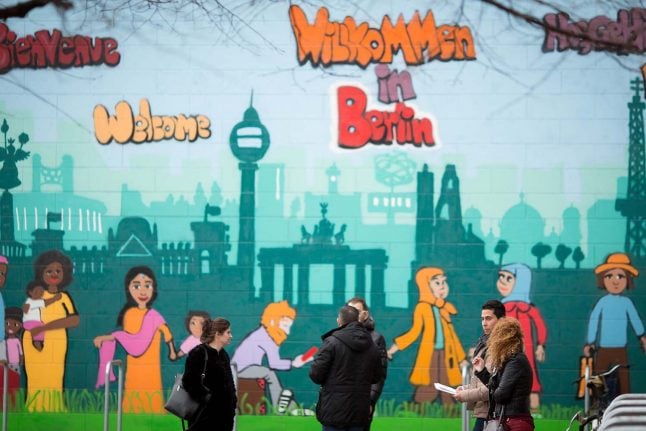On Monday we published our report into people’s experiences at the Ausländerbehörde (foreigners registration office), taking into account the testimonies of internationals who have gone through the process of immigration at offices all over the country.
We received a diverse array of responses from people from across the globe who have decided to call Germany home. Their stories ran the spectrum from ‘my biggest nightmare’ to ‘a great experience’ — and everywhere in between.
READ: Part One – What it's really like to visit Germany's foreigner registration office
The story came amid a significant influx of immigration to Germany. While the refugee influx has grabbed the headlines for years, Germany is also in the midst of a labour shortfall — with the government taking significant steps to increase skilled migration.
At the centre of the process behind immigration in Germany is Engelhard Mazanke, the chief of Berlin’s Ausländerbehörde. While just one of many foreigners' offices across the country tasked with managing migration to Germany, the Berlin office is by far the country’s largest.
In fact, more than one in ten residence permits issued in Germany come through the Berlin office.
We spoke with Mazanke to share some of the concerns from our previous article, while getting a better idea as to the steps that are being taken to improve the functionality of the Berlin office.
READ: Berlin plans to ‘revolutionise’ the immigration experience
Mazanke gave us an indication of the plans for the office and how it proposes to continue to meet growing demand, while also casting itself as a true 'welcome authority'.
‘A fast-growing city’
Mazanke, who has overseen the Berlin Ausländerbehörde since 2011, said that while delays and inconsistency were not ideal, Berlin had experienced significant and unprecedented growth in recent years.
“Berlin is a fast-growing city. This is, above all, due to immigration from abroad,” he told The Local.
“With currently around 430 employees and about 400,000 interviews per year, the Berlin immigration office is by far the largest immigration office in Germany. 12 percent of all residence permits granted nationwide are granted here.”
As we detailed in our report yesterday, people complained about waiting times – whether that be for appointments or during the office's consultation hours, which take place a number of times a week.
Some of our sources complained at having to line up at 1am in order to get a spot during the consultation hours, before waiting until 4pm to see someone.
Mazanke said he was aware of concerns about waiting times and revealed the authority will expand the staff cohort by 45 by the end of 2019.
“It is true that it some areas of the office it is not easy to get an appointment in a timely fashion. The waiting time is between three days and three months,” he said.
“About 60 percent of our customers come with an appointment.
“But it is always possible to come without an appointment, if you can’t wait that long”

Ausländerbehörde boss Engelhard Mazanke shows German Chancellor Angela Merkel around the facility. Image: DPA
Brexit-related challenges
Mazanke said that the fallout from Brexit had also caused additional complications.
“We face many challenges. For example, the Berlin Immigration Office was the first to create a registration procedure for Britons who may be affected by Brexit,” he said.
“We are responsible for examining the first residence permits for Britons living in Berlin for many years.”
READ: The ultimate Brexit checklist for Brits in Germany.
READ: What you need to know about registering in Berlin ahead of Brexit
‘An exemplary model nationwide’
Aside from wait times, another of the major complaints to come out of our investigation was the complex rules. Several of our sources cited inconsistencies between official requirements and what they were being told during their meetings.
One of our sources, Tim R from Australia, says he was told there was no such thing as a working holiday visa in Germany by the person handling his case in Stuttgart. Another, Anton Pluschke, told The Local that when applying in Cologne and Berlin, he was informing the official of the rules, rather than the other way around.
Berlin Ausländerbehörde boss Mazanke told The Local that although he was unable to comment on the experiences of individuals, the staff are subject to significant and ongoing training regimes.
“All employees are trained on a regular basis and undergo a comprehensive training program prior to their assignment, (the program) is an exemplary model nationwide,” he said.
“In addition to training on the law, there are also training courses for de-escalation and intercultural engagement.
“(Training) is the responsibility of an education and training area, which is assisted by a team of experienced staff.
“We are continually trying to improve.”

Berlin foreigner registration office boss Engelhard Mazanke with German chancellor Angela Merkel. Image: DPA
‘A real welcome authority’
A spokesperson for the Berlin Senate of the Interior told The Local that while authorities were aware that some people had negative experiences in other parts of the country, they were in the process of making significant improvements to the Berlin office.
“We can only really speak to the Berlin foreigner registration office,” he said. However “the current transformation of the immigration office will of course involve more than just changing the doorplate”.
“Currently all necessary structures and steps are being examined. We are aiming for a speedy transition during this period.”
The transition phase has already begun, with many of the changes to be put in place by the end of 2019 – including a shift from passport stickers to electronic visa cards which have been common place in other parts of Germany for several years.
“Berlin needs and wants immigration for humanitarian reasons as well as for economic and labour market reasons,” he said.
“The new state office is a clear signal that we are moving in the direction of a welcoming culture of immigration.”
p.p1 {margin: 0.0px 0.0px 0.0px 0.0px; font: 12.0px Helvetica}
p.p2 {margin: 0.0px 0.0px 0.0px 0.0px; font: 12.0px Helvetica; min-height: 14.0px}
p.p3 {margin: 0.0px 0.0px 0.0px 0.0px; font: 12.0px Arial; color: #232323}
p.p4 {margin: 0.0px 0.0px 0.0px 0.0px; font: 12.0px Arial; color: #232323; min-height: 14.0px}
p.p5 {margin: 0.0px 0.0px 12.0px 0.0px; line-height: 14.0px; font: 12.0px Arial; color: #042eee}
p.p6 {margin: 0.0px 0.0px 12.0px 0.0px; line-height: 14.0px; font: 12.0px Arial; color: #232323; -webkit-text-stroke: #232323}
p.p7 {margin: 0.0px 0.0px 12.0px 0.0px; line-height: 14.0px; font: 12.0px Arial; color: #232323; -webkit-text-stroke: #232323; min-height: 14.0px}
span.s1 {font: 12.0px Helvetica; color: #000000}
span.s2 {font-kerning: none}
span.s3 {font-kerning: none; color: #232323}
span.s4 {text-decoration: underline ; font-kerning: none; color: #042eee}




 Please whitelist us to continue reading.
Please whitelist us to continue reading.
Member comments